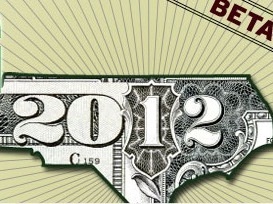FollowNCMoney.org launches to track flood of outside election money in NC (UPDATED)

(NOTE: We want to emphasize that FollowNCMoney.org has been released as a beta version only, in part because of gaps and inconsistencies in the data it draws on. Please let us know of any problems you see as we refine and improve the site!)
We all know the story: Money is flooding into politics at a record pace. The fastest-growing stream of election-year spending is coming from independent groups, those not tied -- at least legally -- to a candidate or party, thanks in part to the Supreme Court's 2010 Citizens United decision.
Nationally, the rise of super PACs and other election-year money vehicles has sparked widespread media interest and public debate. But the influence of independent spending groups on state-level politics has received far less scrutiny -- even though infusions of outside money often have a disproportionate impact in smaller state races.
Enter FollowNCMoney.org. Today, the Institute for Southern Studies/Facing South is launching North Carolina's first searchable database of election-year spending by independent groups in state races.
Looking at the battleground state of North Carolina, the website is one of the first in the nation to systematically track the growing influence of independent groups in state-level politics.
FollowNCMoney.org gathers all reports on TV ads, mailers and other independent expenditures by outside groups in North Carolina, and places them in an easy-to-use searchable and sortable database. Users can sort the information by the name of the group spending the money, the date of the expenditure, the political race where it appears and the affected candidate.
FILLING IN THE GAPS
We're launching FollowNCMoney.org as a beta release, largely because of gaps and inconsistencies in government reports. For example, a search of the NC State Board of Elections website for Independent Expenditures and Electioneering Communications* -- the two main ways independent election spending is classified in NC -- reveal only a fraction of the committees putting money into state-level politics.
In the individual reports, other problems surface. In some cases, the committee doesn't report whether the TV ad or other expenditure was aimed at supporting or opposing the candidate. Other reports group together multiple races, making it unclear how much is going to any given district or area.
State officials say the confusion and omissions are a result of groups improperly filling out the forms, and the state board doesn't have enough resources to follow up. Either way, the public is left without a way to easily access information on who is spending money on state politics, and where that money is going.
To help fill the gaps, FollowNCMoney is asking readers to "crowdsource" information about TV and radio ads, mailers and groups that need to be covered by sending a tip.
ON A RECORD PACE?
FollowNCMoney.org data suggests that North Carolina's independent groups may already be on pace to match or supercede earlier records.
In 2010, North Carolina was a case study in the growing influence of outside election spending, with more than $2.6 million spent on N.C. legislative races by 11 independent groups. That year, outside money benefited Republican candidates by a 10-to-1 margin, aiding the GOP's historic wins in the N.C. General Assembly.
In 2012, with North Carolina boasting a marquee governor's race and both parties again vying for control of the legislature, outside spending has already eclipsed 2010 levels. To date, FollowNCMoney.org has identified more than 100 expenditures totalling more than $2 million for state races.
However, such results are only preliminary, and my reflect duplications, ommissions and other errors in the data.
Visit FollowNCMoney.org and follow us on Twitter to learn more.
UPDATE: Thank you to readers who have helped us flag errors or confusing issues in the database, this is what beta testing is all about! Two issues we've seen crop up already:
1) Duplicate Entries: Groups often report the same expenditure in multiple reports, leading to double-reporting of the same expenditure. Sometimes it really is a different expenditure -- for example, two different radio ads on the same day in the same race, but with different themes. But often it's a duplication that inflates the numbers. We're weeding through the data to determine which expenditures should stay, and which should go.
2) Doesn't Say Whether Support/Oppose a Candidate: Depending on the kind of report a group files, it may or may not say whether the expenditure supports or opposes a candidate.* So far, FollowNCMoney.org only marks "support" or "oppose" if it's specifically indicated on the report submitted by the group. We're looking at adding a way to indicate if it's known who the expenditure benefits even if that information doesn't appear on the report.
* For example, there are different reports in North Carolina depending on whether the money is spent on "electioneering communication" or "independent expenditure." According to the N.C. State Board of Elections, an electioneering communication is a form of communication that refers to a candidate within 60 days of a general election and does not expressly advocate for the election or defeat of the candidate. An independent expenditure is an expenditure made to expressly support or oppose the election of a candidate and is not coordinated with the candidate, the candidate's committee or a political party. The NC FreeEnterprise Foundation has a good overview of the issue here.
Tags
Chris Kromm
Chris Kromm is executive director of the Institute for Southern Studies and publisher of the Institute's online magazine, Facing South.
